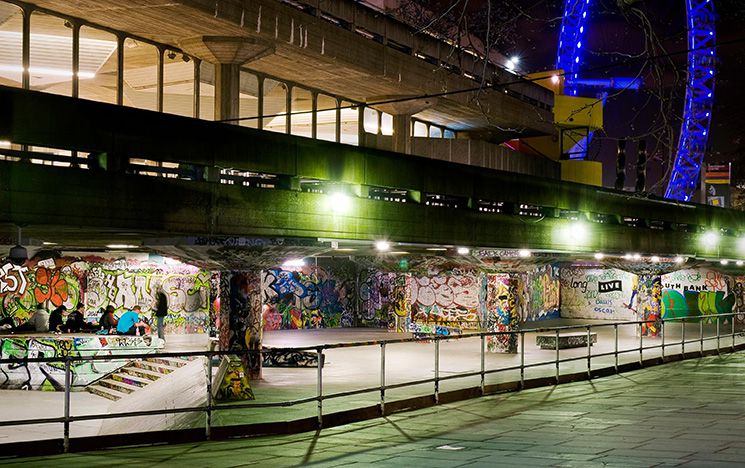You can't move history
What makes a space valuable and who gets to decide this? Dr Pollyanna Ruiz's research gives central voice to young people in the debate on the value of heritage.

Changing perceptions of heritage and skating
Dr Pollyanna Ruiz's work focuses on how dissent uses mass media as a powerful tool for social and political activism. In her AHRC funded project Dr Ruiz looked at young people’s attachment to The Undercroft, known to be the “world's oldest surviving skateboarding spot”, and how their campaign to resist its replacement with shops and restaurants involved ideas and preconceptions about heritage. The research followed the Long Live Southbank (LLSB) campaign established to save the site when plans for the ‘refurbishment’ of the Southbank Centre were announced in 2013. It analysed the ways skateboarders’ attachment to the site was communicated to mainstream organisations such as heritage organisations, urban planners, and the media, and gave them a voice through films and collaborative interactive workshops.
Working with the youth filmmaking collective Brazenbunch, the team recorded walking interviews and oral histories with campaigners from the skate community on London’s Southbank, and with the Heritage Lottery Fund’s Young Roots programme to consider ways in which intangible heritage could be better recognised by policy makers.
Award winning transformative communication
The project used films and associated workshops as central tools that allowed the skaters’ voices to be heard by institutional stakeholders including representatives from Southbank Centre, Heritage Lottery Fund, Historic England, the Mayor’s Office, and others, creating a mutual understanding that had not been possible until then. The Director of Policy and Partnerships at the Southbank Centre said that the workshops brought all the participants together, helped lift the lessons and the key meanings out of the heat of the campaign and made them realise why “you can’t move this history”.
Participating in this research increased skaters’ capacity to connect with policy and statutory bodies and gave confidence and a voice to people who wouldn’t have it otherwise. A skateboarder who spoke at one of the workshops said that “it brought us together with a lot of people who it is helpful for us to have conversations with”. Another young skater, who at 15 had been expelled from school, was able to gain “authority and confidence” from speaking on the workshop panel.
You Can’t Move History, the movie
‘You Can’t Move History’ won the AHRC’s Research in Film Awards 2016. The panel noted that “this remarkable piece of work challenges easy assumptions about heritage and creates a fascinating portrait of contemporary urban outsiderness in the process”.
The extensive dissemination of the film (20,000 views on Vimeo and YouTube, presentations in Sweden, Spain, Austria, Italy, Canada, Taiwan, Australia as well as in the UK to over 1,000 people) has altered perceptions about heritage and subcultures. A programme officer at UNICEF UK said that the film “opened my eyes to the beauty and far-reaching benefits of the skate community for young people”.
The Director of the Museum of London has added it to the museum’s archive and said “this research deeply resonates with me as I consider how to create a more tangible and connected place called the Museum of London”. Sara Crofts, Head of Historic Environment, Heritage Lottery Fund (HLF) said “I try and use [the project] where I can around getting people to rethink their notion of heritage, both policy-makers, potential grant applicants or stakeholders.”
Improved children and young people services
Following from the first workshop, and as a result of improved relations, Long Live South Bank and the Southbank Borough Council successfully applied for planning permission to extend and restore the Undercroft. This work includes a Centre for Children and Young People. As a representative of LLSB argues: “If Pollyanna hadn’t done that film that history wouldn’t have been recorded and that valuable case study material which has inspired so many people wouldn’t exist and those unheard voices that the film documents would never have been heard”. The work also informed a new grant programme for young people from the Heritage Lottery Fund.
The research has been used by grassroots skater organisations from Gateshead to Norwich. For example, Skate Southampton used the film as the basis for talking to local councillors and representatives of the police. The film helped “explain to people clearly what we wanted to achieve”. A major tangible result of was a tenfold increase in funding for revamping the city's skate parks.